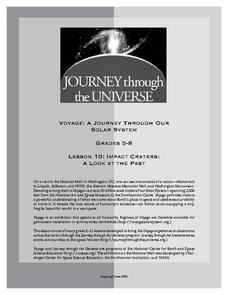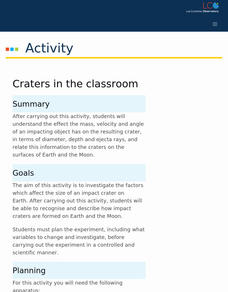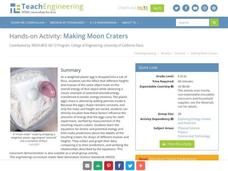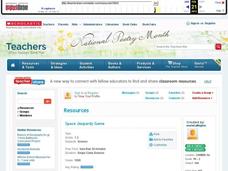Journey Through the Universe
Impact Craters: A Look at the Past
The Galle crater on Mars is also known as the Happy Face crater because of its appearance. First, scholars use pebbles and flour to simulate craters and study their properties. They then apply this knowledge to help decipher the history...
NASA
Whip Up a Moon-Like Crater
The moon is famous for its craters, but they haven't always been there. Young learners experiment with materials to simulate the creation of moon craters. Pupils are able to see patterns in their materials that are similar to the...
Las Cumbres Observatory
Craters in the Classroom
Laws of motion apply both in space and on Earth. Young experimenters model object impact on the Earth and moon. They use data to determine the effect mass and velocity have on the resulting craters and how that relates to the energy of...
American Museum of Natural History
Field Trip Mars
Fly around the Martian surface. Pupils view a presentation on the planet Mars featuring a flyover that shows different views of the surface where rovers have landed and explored on different missions. As individuals watch the images, the...
Howard Hughes Medical Institute
Finding the Crater
A mass extinction event caused by an impact usually leaves a crater. Scholars use data from 10 different sites around the world trying to determine where to look for the crater. They use data, listing the amount of various minerals to...
Glynn County School System
Earth's Magnetic Field and the Moon
The surface of the moon has an amazing tale to tell. Learn about the moon's story with a PowerPoint presentation that describes the unique features of the moon's surface as well as explains its movement in relation to Earth.
Teach Engineering
Making Moon Craters
Create an egg-citing study of energy. Pupils investigate the effect of height and mass on the overall amount of energy of a falling object. The fourth segment in a six-part series on energy uses a weighted egg falling from different...
University of Colorado
Are All Asteroids' Surfaces the Same Age?
Did you know scientists can tell the age of an asteroid by looking closely at its craters? This final lesson of a six-part series focuses on two asteroids, Gaspra and Ida, in order to demonstrate the concept of dating asteroids. Scholars...
University of Colorado
Are All Asteroids' Surfaces the Same Age?
There are more than 600,000 asteroids in our solar system. Pupils analyze images of two asteroids in order to determine if they are the same age. They count craters for each asteroid and compare numbers.
University of Texas
Observing the Moon
Why does it look like there is a man on the moon? Why does the moon look different every night? These are the focus questions of a lesson that prompts class members to observe and record the nightly changes of Earth's natural...
MENSA Education & Research Foundation
The Moon: Earth’s Dependable Neighbor
Scholars become experts on the moon, its phases, and craters with a series of lessons, activities, and extension opportunities. Learners' expert level of knowledge includes moon facts, how moon craters are created, the ability to...
Curated OER
Volcanoes: Second Grade Lesson Plans and Activities
Young geologists explore volcanoes with a series of engaging geology activities. First, they learn the difference between magma and lava before coloring and labeling the parts of a volcano. During the lab, individuals watch a...
It's About Time
Impact Events and the Earth System
What would happen to Earth if an asteroid struck it? Assist young scientists as they explore the mechanics of an impact event and effects caused by it; calculate the energy released once an asteroid strikes Earth's surface; and...
Curated OER
Volcanoes: Sixth Grade Lesson Plans and Activities
Bring a set of pre-lab, lab, and post-lab lesson plans on volcanoes to your earth science unit. Sixth graders explore the three types of volcanoes found on Earth, plot the specific locations of these volcanoes on a map, and...
Curated OER
Regents High School Examination: Physical Setting Earth Science 2009
Junior geologists address 50 multiple choice questions and 35 short answer questions about the earth system. Plenty of visuals are included for interpretation: diagrams, graphs, maps, photographs, laboratory setups, weather symbols, and...
Curated OER
Regents High School Examination: Physical Setting Earth Science 2010
Every topic under the sun is covered in this New York State Regents High School Examination. With the focus of earth science, participants answer 85 quesitons about the solar system, geologic time, rocks and minerals, landforms, and...
Curated OER
Space Jeopardy Game
Students explore space. In this space activity, students analyze the sky and what causes its changes. Students describe the moon patterns and use a model to show changes in its shape. Students also describe the first trip to the moon....
Curated OER
Impact Craters Activity
Lunar explorers perform an experiment to understand the size of the craters on the surface of the moon. They layer flour, laundry detergent, and cocoa powder in a pan to model the lunar surface. They drop marbles from different heights...
Curated OER
Exploring Mars
Students, working in small groups construct scale models of the planets and solar system. They examine images of Mars and discuss what might have caused the features. They record facts about their planetary research in their journals and...
Curated OER
Break the Code: Astronomy
Here is a quick puzzle-style worksheet for your aspiring astronomers. A code is printed at the top of the page and learners use it to fill in the blanks describing different phenomena or objects in outer space. The material does not even...
Curated OER
Asteroids
Students study asteroids and how their size relates to a possible danger of one colliding with Earth. In this asteroids instructional activity students see how big an asteroid has to be to cause destruction to Earth.
Curated OER
Creating Impact Craters
Sixth graders simulate the creation of impact craters on Mars.Through the creation of model surfaces, the effects of an impacting object's mass, velocity and size are determined, and the features of the resulting crater are identified.
Curated OER
TARGET EARTH
Learners explore the possibility of an asteroid hitting planet earth. In this planetary lesson students complete a lab activity to see the effects of an asteroid hitting earth and compare different craters.
Curated OER
Moon: NC Summer Tour Lesson 2007
Students investigate craters and marea. In this crater and marea lesson, students conduct an experiment to create craters. Students participate in a dance activity.

























